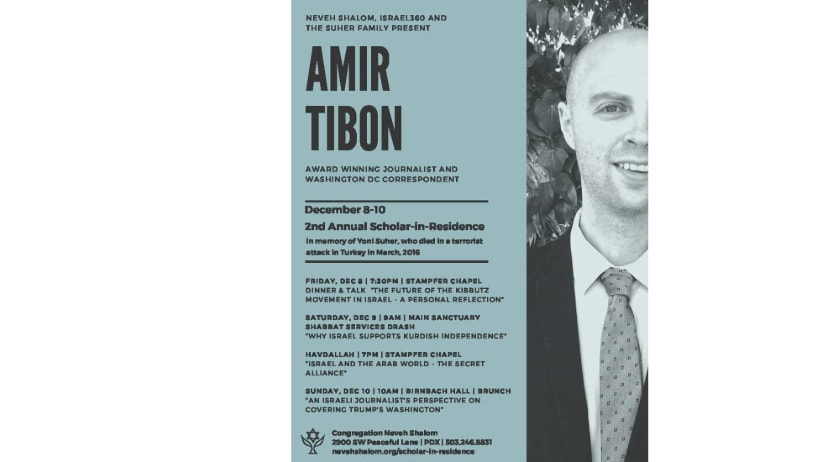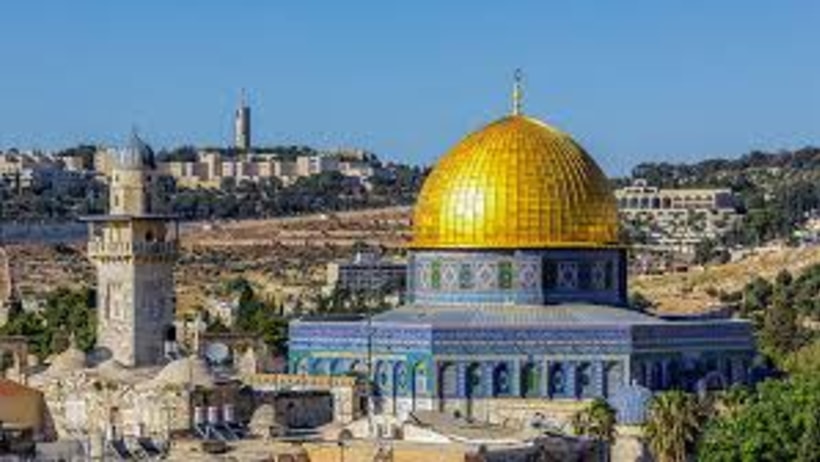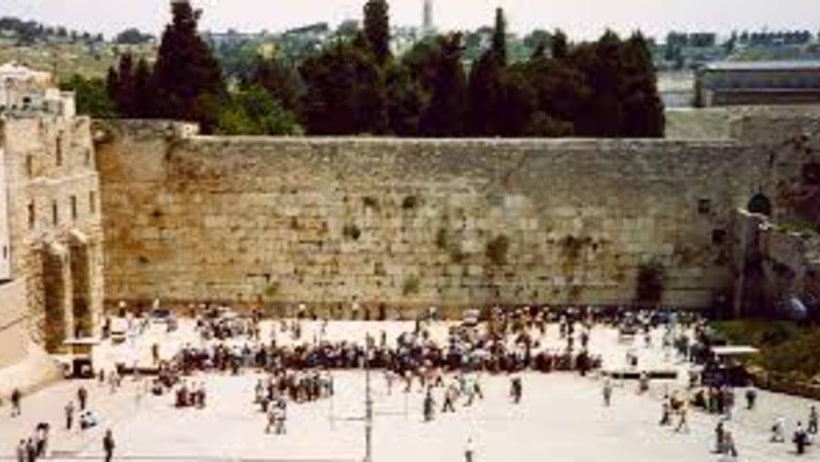Oasis Songs: Musings from Rav D
Friday, December 8, 2017 / 20 Kislev 5778
Scholar in Residence
This weekend is our scholar in residence! Given Amir Tibon’s expertise in Middle East politics, and President Trump’s recent speech about Jerusalem and the United States embassy, this will be a particularly timely event. I hope you will consider attending at least one, if not more, of his talks. On a personal note, I have enjoyably been reading his latest book on the life of Palestinian leader, Mahmoud Abbas. Fascinating stuff. More info about the weekend here.

Jerusalem, The Beloved City of Conflict
Summary: Rabbi Kosak considers President Trump’s decision to move the American Embassy from Tel Aviv to Jerusalem. He offers some historical background that provides needed context, and enumerates some arguments for the move and against the move. Finally, he considers the move from the perspective of disruptive innovation and shares his own opinion.
This past week, President Donald Trump gave a speech in which he noted, “I have determined that it is time to officially recognize Jerusalem as the capital of Israel. After more than two decades of waivers, we are no closer to a lasting peace agreement between Israel and the Palestinians.” While he made no decisions about Jerusalem’s borders or East Jerusalem, it has still unsettled many and created global outrage among them.

Was this a historic decision? And what did the president mean when he said “two decades of waivers?” Let’s take a look at the record.
Historical Background of Embassy Location
The U.S. Embassy has been located in Tel Aviv ever since Israel’s founding in 1948, mainly because United States recognition of Israel came as a response to UN Resolution 181, which did not include the holy city within the boundaries of the Jewish state.

After 1967, Israel conquered East Jerusalem and the Old City. In 1980, the Knesset (Israel’s parliament) passed the Jerusalem Law, which stated that “Jerusalem, complete and united, is the capital of Israel.” The United Nations in turn passed resolution 476 in the same year, declaring the Jerusalem law to be “null and void” as it contravenes the Geneva Fourth Convention (1949).
[It is important to note here that it is problematic but not unreasonable to apply this convention here. After all, it was Jordan that first occupied Jerusalem in 1948, and then annexed it in 1950. From a legal standpoint, it is very difficult to tie down a solid understanding of this. I have only one friend who is a recognized expert of international law and am relying on conversations held with him over many years.]
Then, in February 1992, Bill Clinton declared that he supported recognizing Jerusalem as Israel’s capital. While this was stated during the Democratic primaries as a self-serving campaign promise, it was a step that would alter U.S. policy.
By 1995, both the United States Senate and the House passed the
Jerusalem Embassy Act by wide margins. The bill legally required that the American embassy should be moved to Jerusalem within five years. Clinton himself, intent on seeking a peace agreement between the Palestinians and Israelis, never signed the bill. Indeed, the last three U.S. presidents have relied on a loophole known as a waiver. By signing this waiver every six months, they have been able to delay the implementation of this legislation.
It was to this that President Trump referred when he declared that despite all the waivers, peace is no closer between Israelis and Palestinians. It is an interesting argument, partially true and partially incorrect. Although we clearly lack a signed agreement on final status or a two state solution, it is naive and unfactual to say that no progress has been made. Palestinian leader Abu Mazen (Mahmoud Abbas) has spent most of his career, both during and after the Arafat years, trying to create the institutional structures necessary for a state and self-rule. Abbas’s record is imperfect (whose isn’t?), yet these institutions advance the cause of peace. So do agreements and frameworks between Israeli and Palestinian leadership. At some point, when conditions change and both sides show serious desire to move forward, they will not be starting at ground zero.
Given the complexity of the situation, and people’s strongly held opinions, it may be useful to offer the following arguments both for and against President Trump’s decision.
Some Arguments for the move:
- Israel is a sovereign nation, and sovereign nations are entitled to establish their capital where they want.
- The US’s recognition is not a change of fact, but a recognition of reality.
- Location of bodies of the government: The Kneset, Israel’s Supreme court, the prime minister’s official home and many other government offices. An embassy should be near and have easy access to those institutions.
- Capital of the Jewish people for at least the last 3000 years based on both historical and archaeological evidence.
- This decision is not a change in the US’s commitment to a final status negotiations or the achievement of two states–those are up to the two peoples–and the USA still wishes to help them find a deal they all can agree with.
- It clears up where the USA stands on one issue so that momentum can be gained on others.
- Creates disruption in a frozen stalemate situation. That may create new positive movement where there currently is none.
- One can’t impose preconditions on a negotiation; the purpose of negotiations IS to determine terms.
Some Arguments against the move:
- Bad timing from a leader who seems impetuous.
- Lack of context, preparation or any sort of peace process.
- UN resolution 476.
- It will embolden extremists and weaken moderates throughout the Arab world.
- Scuttle any possible future peace process.
- Gives appearance that US favors Israel and thus won’t be viewed as impartial broker.
- Gives Israel a symbolic win without asking anything of it.
- In the real world, preconditions, spoken or unspoken, are often part of negotiations. This decision breaks what has been a necessary precondition for the Palestinians.
- Doesn’t consider Muslim sentiment or their historical claim to Jerusalem. (They first conquered it in 638 CE. While the Koran does not mention Jerusalem, it does speak of “the farthest Mosque.” The first recorded use of Al Quds for Jerusalem is in 9th century CE. So for the last 1100 years it has been a holy city for Islam.)
Disruption, Perception and One Rabbi’s Opinion
It is important to recognize that some of the arguments both for and against the embassy move are historical facts. But many others are opinions or assertions. No one can honestly say what will make peace and what will prevent it. Any student of history is aware that unexpected events happen which no one could foresee. Nonetheless, when it comes to Jerusalem, the internationally beloved city of age-old conflict, the only certainty that we have is that it will always arouse tremendous passion, emotion and complex political machinations.
Many are celebrating the decision. Others will feel that finally implementing the Jerusalem Embassy Act jeopardizes any chance at peace. While I understand that argument, I don’t see how it materially changes current conditions, unlike settlement expansion, which does change the “facts on the ground.” The meaning ultimately will be determined not by the United State’s move considered in isolation, but by how other actors–Israeli, Palestinian and Arab–respond to it. In other words, this decision is more about a change of perception than a change of conditions. Perception, of course, matters deeply.
As for me? I just returned from the United Synagoge Convention in Atlanta, along with nine other leaders from our synagogue. The theme of the convention was that in a time of disruption and rapid change, we need to dare to change our communities in ways large and small. The antidote to change, in other words, is more change.
While that is true, it neglects the fact that disruption can be terribly destructive, that it often brings new, unforeseen problems along with it and sometimes doesn’t solve the previous problems. Not all change is good. There’s value in making carefully considered changes. There’s necessity to bring as many others along with you when you implement change. It’s important to strive for consensus, even if it will remain out of reach. Once we have taken those steps, however, it is still incumbent that we make change.
I believe that Jerusalem is the eternal capital of the Jewish people. Our claim to her is ancient and unimpeachable by those whose hearts and minds are open to fact and history. I also recognize that it is a holy city for Muslims and Christians and has been for hundreds and hundreds of years. They too have a historic claim to the city. For that reason, it will almost certainly be the seat of government for any future Palestinian state.
Any decision about Jerusalem that can’t somehow cope with all those facts and requirements simultaneously is a poor one. I do not believe that President Trump’s decision has satisfied those demands. It seems aimed at satisfying his base at home and not at advancing a solution. I therefore believe that it lacks wisdom and fails to grasp the realpolitik of the situation.
I pray that I am wrong. I pray that this peculiar disruption will not just be a spur for violence, but will create a still unseen way forward. I pray for the peace of Jerusalem and a just future for all, Palestinian and Jew alike.
Please pray with me,
Rav D
Shabbat Table Talk
- What does it mean to hold that some land is sacred and other land is not?
- Have you yourself ever had a moment when you have experience the sanctity or holiness of land? What was it? How did your experience impact the way you viewed the land?
- How do you imagine that President Trump’s decision will impact Jews of the Northwest? Are you concerned about increased anti-semitism?
If you’d like to continue this discussion, follow this link to CNS’s Facebook page to share your own perspectives on the topics raised in this week’s Oasis Songs. Comments will be moderated as necessary.



